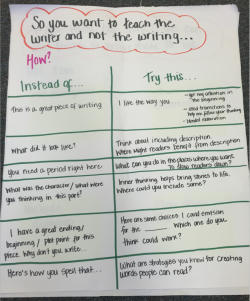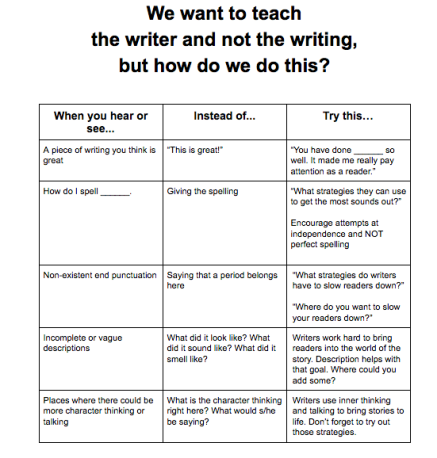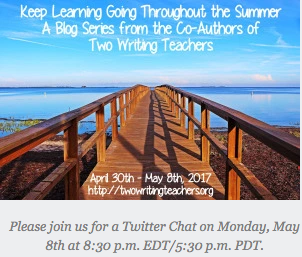I love watching parents and children enjoying our town library during the summer months. There’s so much joy in reading together and selecting piles of books to bring home. My own daughters could never believe how many more books I’d let them take home from the library than from the local bookstore–after all, I was using a plastic card in both places! Parents might not understand reading instruction, but many more parents (and people) consider themselves readers than consider themselves writers. Maybe that’s one of the reasons it’s easier to explain how to support their children’s reading lives that how to support writing lives during summer months–or any months, for that matter!
We all know that writing instruction has evolved, and it’s sometimes really difficult for parents to understand not only the strategies that we use in writing workshops, but also the underlying philosophy that serves as its foundation. I don’t have a lot of opportunities to speak to parents about the why’s, the what’s, and the how’s of workshop instruction, but when I do, I try to stay within that format. Why workshop? For me, more than anything else, workshop instruction teaches children that they not only can write, but also that they are writers. With that mentality, young writers are braver about their choices, processes, and products, more flexible as writers (and learners), and more open to ideas and instruction.
I remember some ugly morning moments at the breakfast table when my father made edits and revisions to my hand-written final drafts on the mornings they were due. (I wish I could tell you why I showed them to him!) He wanted to help–wanted me to be the best writer I could be– and with Dad in mind, I have developed some ideas for how parents with children in writing workshops can help their children, especially during the summer months. Please feel free to add, revise, or eliminate as my list is constantly evolving!
Ways to support your child’s writing life
- Ask your child to tell you stories, and help them structure the stories into a beginning, middle, and end format. Your interest will inspire him/her to want to add the details that make it a story, and telling stories is an important precursor to writing stories.
- Tell your child stories–ones from your childhood, ones from your days– He/she will love hearing about your life, and listening to stories will help develop the understanding of how to tell stories.
- Share any form of writing you do with your child–lists, notes, letters–they all help children realize the importance of writing.
- Give your child opportunities to tell you about what they know. If your child is an expert at Legos, encourage him/her to tell you about it. The more organized the explanation, the better, as this practice will help him/her develop informational writing pieces.
- Encourage your child to persuade or argue with reasons and evidence. Need a new pair of shoes? Convince me! Why do you need a new pair of shoes, and how can you tell? What will happen if you don’t get a pair of new shoes? How will your life improve? This sounds silly, but this type of thinking and speaking will dramatically help your child when s/he’s learning to write opinion pieces.
- Point out the revision process in anything you do together. If you are building blocks, sometimes, you make a different decision about the foundation. If you are cooking, you might add more salt. If you are painting a picture, you might need to start over. These are revision decisions that build flexibility of thought and are critical for writers of all ages and stages.
- Read. Read more. Stop and gasp when you read something beautiful. Stop and laugh when you read something funny. Stop and groan when you read something goofy. Your child will pick up on craft moves and amaze you because they will show up in his/her writing. Make the question “How did the writer do that?” part of your repertoire as you read with children.
Lucy Calkins coined the all-important tenet that we should teach writers and not writing. Just as this phrase serves as my true north in the instruction of writing, it can help parents and caretakers understand how to work with their children. At a Family Write Night, I presented this chart to parents, and they appreciated it:

For the purpose of newsletters, I also created it in digital format. I think it would be a great handout to send home at the end of the year to encourage summer writing. Again, I welcome additional ideas for this chart!

Partnering with parents/caregivers is such an important way to send the message that writing matters, and summer offers so many opportunities!

-
This giveaway is for a copy of Joy Write: Cultivating High-Impact, Low-Stakes Writing. Many thanks to Heinemann for donating a copy for one reader. (You must have a U.S. mailing address to win a copy of this book.)
-
For a chance to win this copy of Joy Write: Cultivating High-Impact, Low-Stakes Writing, please leave a comment about this or any blog post in this blog series by Sunday, May 7th at 12:00 p.m. EDT. Betsy Hubbard will use a random number generator to pick the winner whose name will be announced in the ICYMI blog post for this series on Monday, May 8th.
-
Please be sure to leave a valid e-mail address when you post your comment, so Betsy can contact you to obtain your mailing address if you win. From there, our contact at Heinemann will ship your book out to you. (NOTE: Your e-mail address will not be published online if you leave it in the e-mail field only.)
-
If you are the winner of the book, Betsy will email you with the subject line of TWO WRITING TEACHERS – JOY WRITE BOOK. Please respond to her e-mail with your mailing address within five days of receipt. Unfortunately, a new winner will be chosen if a response isn’t received within five days of the giveaway announcement.



great article!!!!!
LikeLike
Thank you so much, I am excited to get this out to parents!
LikeLike
Thanks for that great chart!
LikeLike
Great ideas to share with parents.
LikeLike
Thanks for some great food for thought and lots of great ideas!
LikeLike
Thank you for sharing this chart and for helping us explain the workshop format of teaching with our parents!
LikeLike
Great ideas to share with parents! This is our schools first year using Lucy Calkins and it has been an adjustment to make sure I am teaching the writer, not the writing.
LikeLike
I look forward to sharing these ideas with families! Thank you!
LikeLike
My goodness! This post is jam-packed with excellent tips to help kids maintain a writing life at home. Thanks for all of these excellent suggestions, Mel!
LikeLike
As well-intentioned as your dad was, he was focusing on the writing, not the writer. Whatever we do in those moments may improve the quality of that particular piece and yet have no effect on the growth of the student who wrote it. It’s a steep uphill climb for even the most well-meaning adults!
LikeLike
Thank you for sharing these ideas! We are new to Writing Workshop and this will be helpful to parents as well as teachers.
LikeLike
Such wonderful suggestions to share with parents. Love the one about reading and stopping when you feel a certain way and then talking about what the author did to make you feel that way.
LikeLike
Great ideas here; especially about using speaking and listening to encourage young children to become confident writers in the future.
LikeLike
Thank you for sharing this great list of ways to help students with their writing – great for parents and teachers!
LikeLike
Great list to give parents!! Would be beneficial at the beginning of the year too. Thanks!!
LikeLike
A great reminder to integrate writing into parent literacy night. Parents want to help but don’t always know how. They help based on how they were taught in school.
LikeLike
I’m going to include a parent writing tip every week now using your helpful list.
Thank you!
LikeLike
Love this blog. This has inspired me to put together a packet of things parents can do to support growth over the summer for all subjects!
LikeLike
Love these ideas for sharing foe sharing with parents! Thank you!
LikeLike
Thank you for these excellent ideas to share with parents! It is so important for students to keep practicing their skills during the summer.
LikeLike
It’s so great to get parent buy-in. Thanks for the ideas!
LikeLike
I know how hard our teachers and students work during the school year to improve student writing. Thanks for providing these practical tips for parents so we can ensure the learning continues. Please enter me in the book giveaways. creatingcuriouskids [at] gmail [dot] com.
LikeLike
Love this! I think we more often think about sharing information about Writing Workshop at the beginning, and then maybe throughout, the year, but these suggestions for sharing at the end of the year are great! Thanks so much for the wonderful ideas!
LikeLike
Thank you so much. I plan to share these writing suggestions with my parents at the end of the year.
LikeLike
Love all your ideas. I wonder about adding in a row on organization.
When you see the story rambles without clear organization, instead of “put it in order”, try “What order makes the most sense? Rehearse it out loud. Try starting at a different point. Which order makes the most sense?
LikeLike
This post came at a perfect time. Gathering ideas to share with parents at a gathering in 2 weeks. Perfect ideas to share with them. Thanks!
LikeLike
Thank you for posting this! The summer writing slide is just as real as the reading slide. I love working with writers rather than the writing.
LikeLike
Teaching the writer and not the writing is such a hard concept to put into practice for parents and teachers. The chart you created does an excellent job showing how to turn our language to teach the writer. What a great idea. Thank you for sharing it!
LikeLike
Thank you for this post! I plan to send this information home to my fifth grade parents so they can help their child “keep the writing switch on” this summer.
LikeLike
This is so practical and inspirational! Thanks for this thoughtful post, just in time for summer.
LikeLike
I love the ideas you presented to share with parents working with their own children.
LikeLike
I am a special educator teaching pull out replacement language arts. Your anchor charts are helpful and encouraging. However, I feel the language my be to difficult for my first and second grade groups. What are your suggestions in making the language into a more age appropriate for my kiddos to really understand what to include when struggling to write?
LikeLike
I love this post! I have shared with the teachers that I serve on my campus. We are hosting a parent event in two weeks and plan to share this information. Thank you!
LikeLike
I love helping parents keep the learning going! THANKS! wendy 1stgradefireworks
LikeLike
The ideas presented here and throughout the week to enlist the help of parents and to keep our students writing throughout the summer are solid ways that we as teachers can advocate for our students as life-long learners. Thank you.
LikeLike
I plan on sharing this with my fellow writing teachers, especially the part about revising! What a great mental image to help young writers understand that revising is a natural part of the writing process!
LikeLike
Thank you for providing some great suggestions. The digital chart is such a wonderful addition to help support parent involvement.
LikeLike
Thank you for this wonderful list. I am excited to share it with my K-moving onto 1st families. For several years now I have given, as an end of the year gift to my students, writing notebooks and pens to encourage writing over the summer. I also give them a stack of blank booklets that we use in class. It will be nice to include this list with the notebooks this year. Many thanks!
LikeLike
Thank you for connecting writing and families. We will be sharing these ideas with local teachers and administrators soon!
LikeLike
Thank you for these authentic ideas and suggestions for building a strong foundation for writing. These tips will definitely be included in my summer family letter! Strengthening the reading, storytelling and writing connection goes a long way in creating amazing readers and writers.
LikeLike
I am always looking for ways to support my young writers. Our school is currently rewriting their writing curriculum. This will be a terrific resource. Thank YOU!
LikeLike
Love this! I also encourage writers to keep an “anything goes” mini notebook with them. It can be used for doodles, story ideas, poems, great lines from books, shopping lists, questions, wonderings, overheard dialogue…anything. I find it can help develop the writing habit, spark new ideas, and demonstrate that stories can be found anywhere…
LikeLike
School-based involvement is decreasing, but parents often ask for ways to support learning at home. The handout you shared is a simple, but effective way to encourage writing-and correct parent support-at home over the summer!
LikeLike
Great post and suggestion! I have moved from upper elementary to Kindergarten and have loved watching my students grow as writers this year. I enjoy learning about this process and ways to help my students become confident writers. Your blog is great!
LikeLike